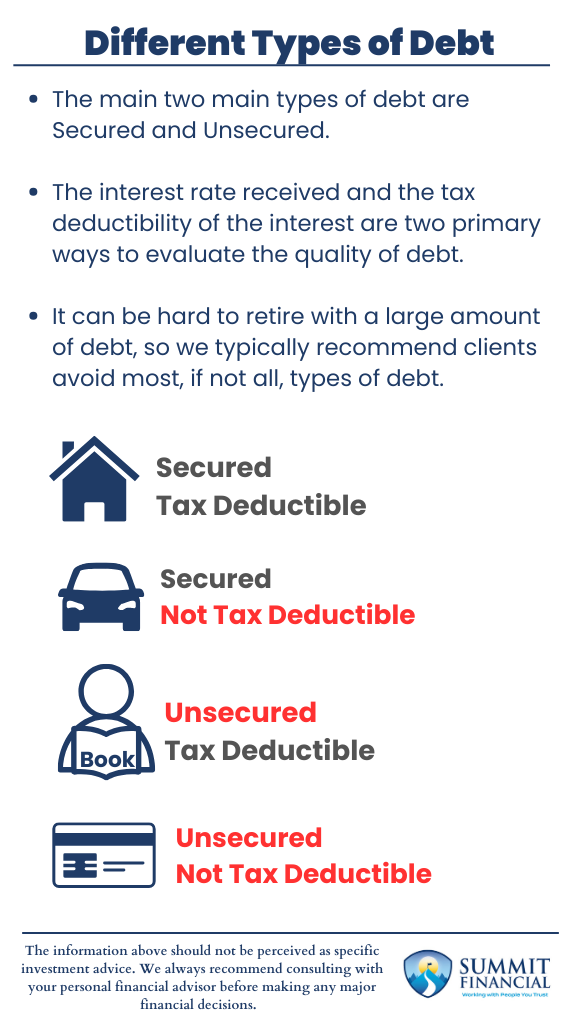- The main two types of debt are Secured and Unsecured.
- The interest rate received, and the tax deductibility of the interest are two primary ways to evaluate the quality of debt.
- It can be hard to retire with a large amount of debt, so we typically recommend clients avoid most, if not all, types of debt.

Debt can be very intimidating for many individuals, and rightfully so. If left unchecked, debt can snowball to a level that will prevent all discretionary spending and savings.
In these cases, the power of compounding interest works against you as debt will grow and accumulate at an exponential rate if appropriate payments are not made.
Our goal for this blog is to provide a high-level overview of the different types of debt and when one may be more preferential than the other.
What Is Secured Debt?
First, it is important to know that there are two main types of debt: Secured and Unsecured. Secured essentially means there are assets that are put up for collateral in case the debt payments are not made.
For example, a mortgage is a secured debt because the home is used as collateral. A car can be repossessed if payments are not made, so auto loans are a form of secured debt.
What Is Unsecured Debt?
Credit cards are unsecured since this debt is backed only by the debt paying ability of the individual. Since secured debt has a collateral component, this is deemed lower risk by the bank since they can always retrieve the physical property.
Because of this, secured debt tends to have a lower interest rate associated with it. The unsecured nature of credit cards is why they may have interest rates as high as 20% at times.
How Interest Rates and Tax Deductibility Impact Debt Quality
The tax deductibility of the interest payments is also important to be aware of. Some forms of debt will allow you to receive a tax deduction for the interest payments that have been made over the year.
Two of the most common examples of this are mortgage and student loan interest payments.
Obviously, it is preferred to have debt that has tax deductible interest. This would lower the overall net cost of the debt since you would receive the benefit of saving on taxes.
Non-Traditional Debt: 401(k) Loans and Personal Loans
There are two other sources of debt that we wanted to cover that may be considered non-traditional.
First, we do not want to miss the concept of a 401(k) loan. These are great tools if needed since, in many cases, the principal and interest payments would be paid back into the retirement account. This route possibly has the lowest cost of debt since you are essentially making a loan to yourself.
There are loan limits and other restrictions to be aware of, though, if you are attempting to transfer or roll over an account with an existing loan.
Keep in mind that taking a loan from your 401(k) may involve risks, such as potential fees and lowering your growth potential. Lastly, we know there are times when loans happen between friends and family.
While these loans may never go on paper, and often, no interest is charged, we want to warn our clients against pursuing this route. Loans between people who are personally close with one another can lead to additional stress on the relationship.
This stress is sometimes strong enough to split two people apart and we do not believe any scenario is worth the possibility of that outcome.
Retirement and Managing Debt
To be able to afford retirement, we typically steer clients away from debt. The interest payments can drain discretionary income and prevent savings that may have accumulated over time.
Plus, debt payments throughout retirement may be tough to afford if the individual is living off a limited income stream such as Social Security, Pension, or Annuity benefits.
Debt can also be very challenging from a mental or emotional perspective. It is not easy to know that you owe others money, and this could cause you to lose sleep at night. For all of these reasons and more, we tend to pursue other alternatives rather than taking on debt.
Of course, debt cannot always be avoided, and it may actually be advantageous when interest rates are low. This is why we always review our client’s specific situations before recommending any action.
Speak With a Trusted Advisor
If you have any questions about your investment portfolio, retirement planning, tax strategies, our 401(k) recommendation service, or other general questions, please give our office a call at (586) 226-2100. Please feel free to forward this commentary to a friend, family member, or co-worker. If you have had any changes to your income, job, family, health insurance, risk tolerance, or your overall financial situation, please give us a call so we can discuss it.
We hope you learned something today. If you have any feedback or suggestions, we would love to hear them.
Sincerely,
Zachary A. Bachner, CFP®
with contributions from Robert Wink, Kenneth Wink, James Wink, and James Baldwin
If you found this article helpful, consider reading:
- How Do Bull Markets and Bear Markets Differ
- Navigating College Funding
- Financial Planning Mistakes to Avoid
- Tax Filing Explained
Sources:
- https://www.investopedia.com/terms/d/debt.asp
- https://www.investopedia.com/ask/answers/110614/what-are-main-categories-debt.asp#:~:text=Different%20types%20of%20debt%20include,auto%20loans%2C%20and%20personal%20loans.
- https://www.nerdwallet.com/uk/personal-finance/types-of-debt/
- https://turbotax.intuit.com/tax-tips/small-business-taxes/can-i-write-off-credit-card-interest-on-my-taxes/L8tQTpRfM
- https://www.investopedia.com/articles/retirement/08/borrow-from-401k-loan.asp


